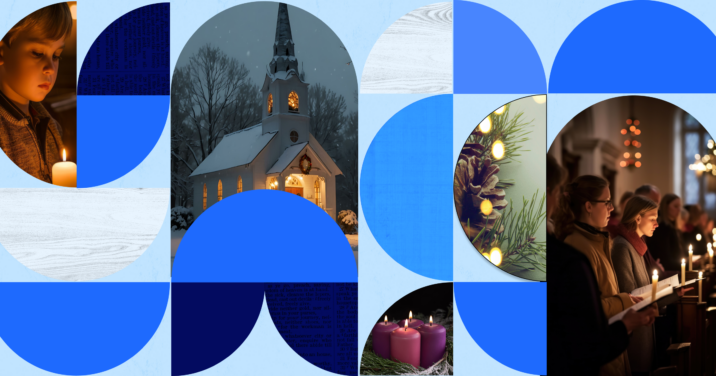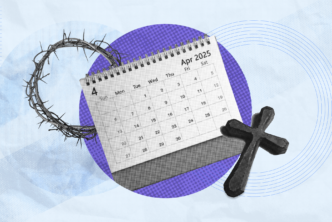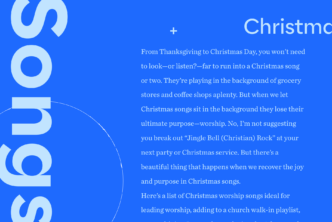What is Advent? Advent is a season in the church calendar that spans the four weeks leading up to Christmas and ends on December 24. Each Sunday coincides with the lighting of one of four candles—a purple one on the first, second, and fourth Sunday, and a pink one on the third Sunday. Each week of Advent has a theme:
- Week 1: Hope
- Week 2: Peace
- Week 3: Joy
- Week 4: Love
Liturgically, the Christmas season (or Christmastide)—also called the Twelve Days of Christmas—begins at sunset on Christmas Eve and is celebrated as a feast until January 6, when liturgical churches celebrate Epiphany.
Christians who celebrate Advent see it as a time of expectancy and preparation for Jesus’s arrival—which happened first in the incarnation (Jesus’s birth) and will happen again at his return. Generally, the first two Sundays of Advent are focused on the second coming of Jesus, and the second two are focused on his first.
For some, Advent is a reminder to find rest in a season notoriously wrought with materialism, busyness, and exhaustion. It’s a time to open a door on a calendar or light a candle while still embracing the wonder of Christmas.
But for others, especially those in more liturgical traditions, Advent is something far deeper—it’s a time to remember that the world is not as it should be, that there is pain and grief and darkness that has yet to be finally remedied. Observers marinate in the reality of the already-and-not-yet, that Jesus has come and will come again, and that the brokenness of the world will be made right. Those who follow Advent in this way wait to begin celebrating Christmas until Christmas Day, when all of the pent-up Christmas energy is released over the Twelve Days of Christmas.
Regardless of how you observe Advent, all Christians benefit from shutting out much of the Christmassy commercialism to focus on what really matters and prepare our hearts and minds to remember Christ’s first—and second—coming. One way to do this is by spending time in an Advent devotional, either on your own or with a group (perhaps your family).
***
N. T. Wright on what Advent is and why Christians celebrate it
In the following excerpt from the introduction of Advent for Everyone: A Journey through Matthew, N. T. Wright answers the question, “What is Advent?” by offering a broader, deeper understanding of what it means—and why Advent is important for believers today.
Advent itself can be puzzling. “Advent” means “coming” or “arrival.” The hymns and readings often used at this season seem to be about two quite different things: about waiting for the “first coming,” the birth of Jesus, and about waiting for his “second coming” to put all things right in the end. How did these things get muddled up? How can we make wise, prayerful sense out of it all?
The early Christians developed the “church’s year” as a way of telling, learning, and reliving the story of Jesus, which stands at the heart of our faith. As they did so, they came to understand that it wasn’t simply a matter of going round and round the same sequence and never getting anywhere.
Think of a bicycle wheel; it goes round and round, but it is moving forwards, not standing still. … So it is with the church’s year. We go round the circuit: Advent, Christmas, Epiphany, Lent, Holy Week and Good Friday, Easter, Pentecost. The traditional Western churches sum all this up on Trinity Sunday, as we learn more deeply who our glorious God really is.
… [But] we are not simply going round and round the same topics and never getting anywhere. We are signing on as part of God’s larger project, God’s forward purposes, his plans for the whole creation to be renewed, so that (as the prophets said) the earth will be full of the knowledge and glory of the Lord, as the waters cover the sea. … That is the Advent hope.
So the Church’s year overlaps with itself. In Advent, we think our way back to the ancient people of God, to the call of Abraham and his family as the start of God’s rescue operation for a world in ruins and a human race in chaos. We follow the story of Israel’s hope, a hope that refused to die no matter what terrible things happened; a hope that the first Christians believed had become human in the baby Jesus.
With that “first Advent,” it was clear that God’s rescue operation for humans and the world had been decisively begun but not yet completed. Jesus really did launch God’s kingdom “on earth as in heaven” in his public career, his death, and his resurrection. But it was clear, because of the sort of thing this kingdom was, that it would then need to make its way through the humble, self-giving service of Jesus’ followers, until the time when Jesus would return to finish the work, to put all things right, to banish evil and death forever, and bring heaven and earth completely together.
The “second Advent” then, overlaps with the first. We celebrate Jesus’s first coming, and use that sense of fulfillment to fuel our hope for his second coming and to strengthen us to work for signs of that kingdom in our own day. … That is one way of saying what it means to be a follower of Jesus.
Related resources






